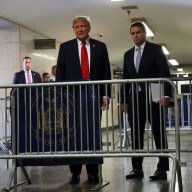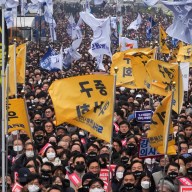“Khovanshchina,” composed and written by Modest Mussorgsky, will be performed at the Metropolitan Opera on March 10 at 7:30 p.m., March 13 at 7:00 p.m., and March 17 at noon.
Welcome to the first edition of Off-Off-Broadway, Metro New York’s new theater blog brought to you by the creator of The Obscure Art of Cinema. Most of these Off-Off-Broadway plays, musicals, spectacles, and other kinds of dramatic performance will have longer runs, giving you an ample opportunity to catch them while they’re still onstage. Today, however, I will be reviewing Modest Mussorgsky’s Russian national music drama “Khovanshchina,” whose final three performances of the season will take place at the Metropolitan Opera over the following week.
Opening with the gathering light of dawn illuminating the Red Square and ending in fires of immolation at an Old Believers’ Hermitage in the woods, August Everding’s production of “Khovanshchina” is the most dramatically compelling and spectacularly realized production in town (with the possible exception of Michael Grandage’s production of Mozart’s “Don Giovanni,” also playing at the Met through next week). Like Mussorgsky’s more famous opera “Boris Godunov,” this drama en musique delivers deliriums of intoxicating arias, striking set-pieces, and prodigal moments of lyrical and emotional grandeur without sacrificing character or narrative drive. Set in the late Seventeenth Century during the minority of Czar Peter (the Great) Romanov, who is never seen because of a prohibition at the time of the work’s creation on showing members of the royal family onstage, the historical plot depicts the Khovansky Rebellion and the suppression of the Old Believers as the young Czar and his advisers strip the Boyars of their considerable influence and consolidate political and religious power around the throne.
Coinciding with the election of Vladimir Putin as Russia’s President in his thirteenth year as the nation’s de facto leader, Mussorgsky’s tale of the strategy and human costs behind the centralization of governmental authority shows itself to be both timely and timeless in its understanding that the manipulation of public opinion and terror by proxy are paramount in achieving and maintaining political hegemony. Then as now, leaders debate whether their fated nation should follow the example of the West or find a uniquely Russian way forward, while the Orthodox Church wages its own internal struggle of allegiance between the Kremlin and the people. These opposing, allied, and always intermingled forces are brilliantly represented in the opera by morally ambivalent characters whose eloquent music bring these eternal questions to life with seductive rage and melancholy beauty. Moving from scene to scene with stately grace, Mussorgsky’s score (with some posthumous revisions by Stravinsky and Shostakovich) masterfully blends raucous and otherworldly choral scenes, deeply expressive arias, dramatic imbroglios, and instrumental tone painting to depict a land caught between profanity and holiness, struggling to be reborn.

















